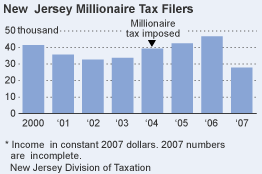On with Dayton’s tax plan!
April 25th, 2011
Doggin’ the rich! Good idea…
And you know how everyone says, “OH, NO… CAN’T DO THAT, the rich will flee the state,” which we all know is a crock.
From the Minnesota Dept. of Revenue:
Minnesota 2011 Tax Incidence Study
Here’s a take on that from the voice of money, the Wall Street Journal:
“This suggests that the policy effect is close to zero,” the study says.
Millionaire Tax Didn’t Chase the Rich From New Jersey, Study Says
“This suggests that the policy effect is close to zero,” the study says.
“In summary, the new tax did not appreciably increase out-migration,” the study concluded.

